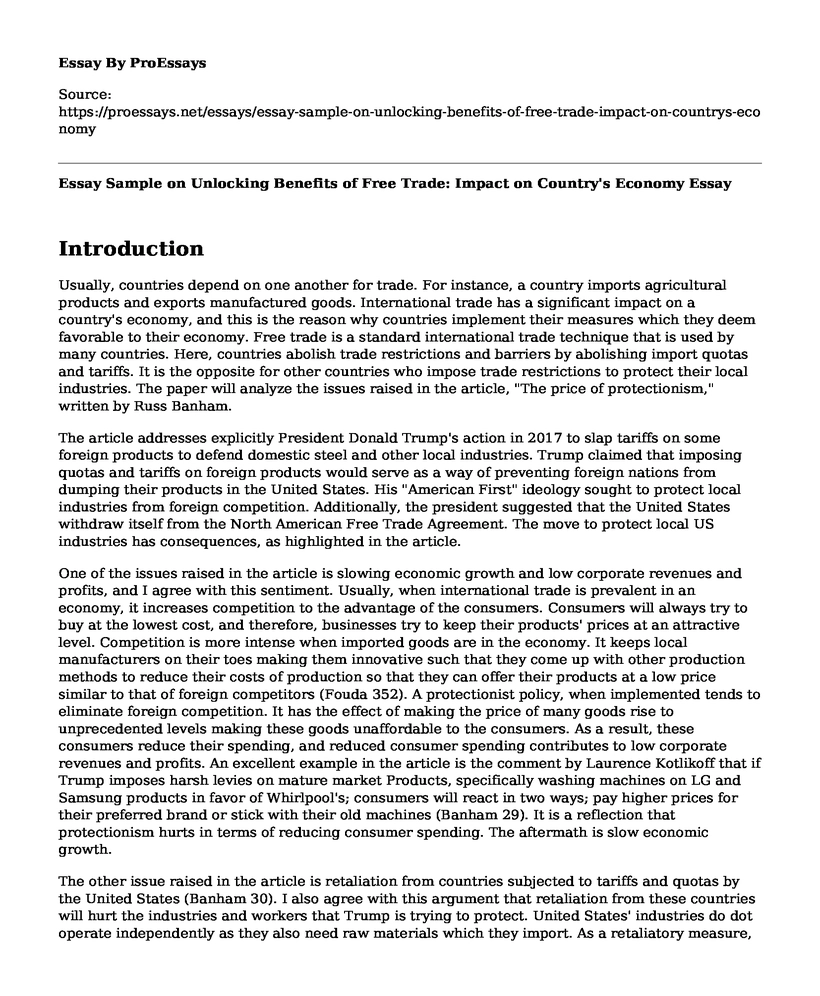Introduction
Usually, countries depend on one another for trade. For instance, a country imports agricultural products and exports manufactured goods. International trade has a significant impact on a country's economy, and this is the reason why countries implement their measures which they deem favorable to their economy. Free trade is a standard international trade technique that is used by many countries. Here, countries abolish trade restrictions and barriers by abolishing import quotas and tariffs. It is the opposite for other countries who impose trade restrictions to protect their local industries. The paper will analyze the issues raised in the article, "The price of protectionism," written by Russ Banham.
The article addresses explicitly President Donald Trump's action in 2017 to slap tariffs on some foreign products to defend domestic steel and other local industries. Trump claimed that imposing quotas and tariffs on foreign products would serve as a way of preventing foreign nations from dumping their products in the United States. His "American First" ideology sought to protect local industries from foreign competition. Additionally, the president suggested that the United States withdraw itself from the North American Free Trade Agreement. The move to protect local US industries has consequences, as highlighted in the article.
One of the issues raised in the article is slowing economic growth and low corporate revenues and profits, and I agree with this sentiment. Usually, when international trade is prevalent in an economy, it increases competition to the advantage of the consumers. Consumers will always try to buy at the lowest cost, and therefore, businesses try to keep their products' prices at an attractive level. Competition is more intense when imported goods are in the economy. It keeps local manufacturers on their toes making them innovative such that they come up with other production methods to reduce their costs of production so that they can offer their products at a low price similar to that of foreign competitors (Fouda 352). A protectionist policy, when implemented tends to eliminate foreign competition. It has the effect of making the price of many goods rise to unprecedented levels making these goods unaffordable to the consumers. As a result, these consumers reduce their spending, and reduced consumer spending contributes to low corporate revenues and profits. An excellent example in the article is the comment by Laurence Kotlikoff that if Trump imposes harsh levies on mature market Products, specifically washing machines on LG and Samsung products in favor of Whirlpool's; consumers will react in two ways; pay higher prices for their preferred brand or stick with their old machines (Banham 29). It is a reflection that protectionism hurts in terms of reducing consumer spending. The aftermath is slow economic growth.
The other issue raised in the article is retaliation from countries subjected to tariffs and quotas by the United States (Banham 30). I also agree with this argument that retaliation from these countries will hurt the industries and workers that Trump is trying to protect. United States' industries do dot operate independently as they also need raw materials which they import. As a retaliatory measure, foreign countries might put conditions that make it hard for United States industries to import these raw materials. Absence of raw materials from these industries will lead to low productivity and subsequent low employment. It is reflected in the shrinking trade deficit. For instance, in the article, the US merchandise trade is highlighted with total exports in 2015 being $1.5 billion, reducing to $1.4 billion in 2016 (Banham 31). The result is hurting local producers which replicate to low employment.
Work Cited
Fouda, Regine Adele Ngono. "Protectionism & Free Trade: A Country'S Glory Or Doom?." International Journal of Trade, Economics and Finance (2012): 351-355.
Bahman, Russ. "The Price of Protectionism." Solar Energy Industries Association. 29-33.
Cite this page
Essay Sample on Unlocking Benefits of Free Trade: Impact on Country's Economy. (2023, Feb 12). Retrieved from https://proessays.net/essays/essay-sample-on-unlocking-benefits-of-free-trade-impact-on-countrys-economy
If you are the original author of this essay and no longer wish to have it published on the ProEssays website, please click below to request its removal:
- Paper Example on Wal-Mart and What It Means for the Foreign Market
- Using RFID to Improve Inventory Accuracy in Apparel Retailing Industry - Paper Example
- Tesco Case Study
- Summary of the History Amazon - Essay Sample
- Essay Example on Walmart: The Global Retail Chain With Low Prices and Discounts
- Retaining Competitive Edge: Amazon Case Study on E-Commerce Retail Mgmt.
- Essay Sample on Walmart: The Largest US Multinational Retail Firm







